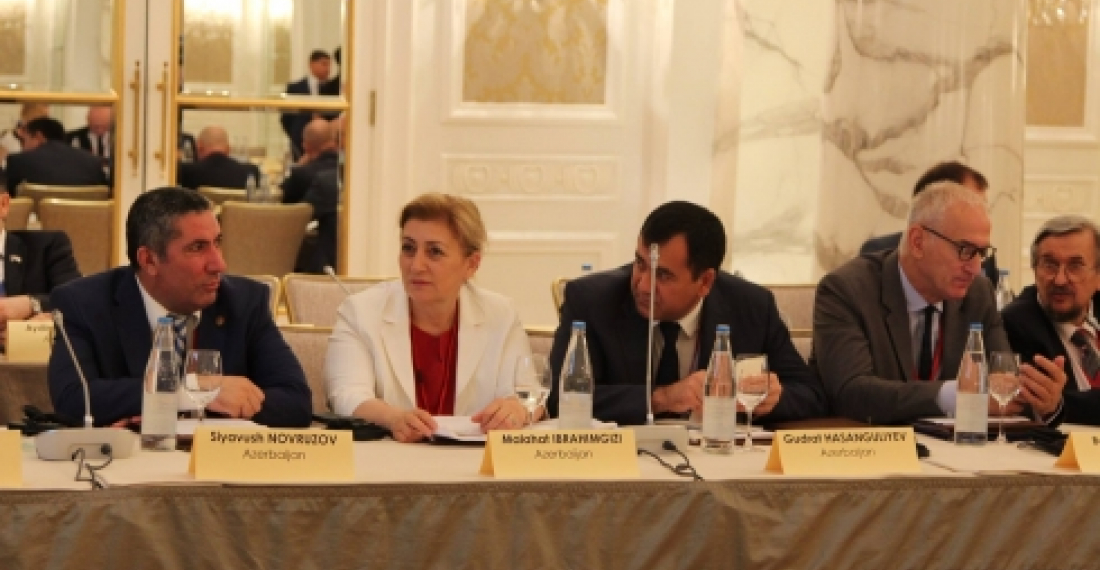Although in the past decade there have been hundreds of meetings between Armenian and Azerbaijani politicians and civil society representatives in different parts of the world, it is rare that the two sides are able to engage in a debate on home territory. The seminar being held by the NATO Parliamentary Assembly in the Azerbaijani capital Baku is offering a rare opportunity for members of parliament from the two countries to exchange views on a number of issues, including the Nagorno-Karabkah conflict on home territory. An Armenian Parliamentary delegation is in Baku to participate in the event and this was welcomed by the organisers of the seminar, as well as many of the participants.
The problem is that the politicians are sticking strictly to the script. In a number of exchanges during the course of the first day of the seminar both Armenian and Azerbaijani MPs repeated often heard maximalist positions on the conflict, its origins and its resolution. This caused frustration amongst some of the NGO representatives present who made several appeals to the politicians to engage in a more constructive manner.
Two issues were particularly contentious: how to reconcile the principles of territorial integrity and self-determination in the context of the Nagorno-Karabakh conflict, and the participation of the self declared Nagorno-Karabakh Republic in the current negotiation process.
Speaking for the Armenian side, MPs Tevan Poghosyan and Koryun Nahapetyan insisted that the principles of territorial integrity and self determination were equal, and that it was not possible to speak about the territorial integrity of Azerbaijan without referring also to the right of the people of Nagorno-Karabakh for self determination. This was challenged by the Azerbaijani delegation. Deputy Speaker of the Milli Meclis Ziyafat Asgerov, and MPs Siyavoush Novruzov, Gudrat Hasanguliev, Zahid Oruij and others argued that Azerbaijan was the victim of aggression. Its territory had been occupied and hundreds of thousands of its people were displaced. They further added that the principle of self determination was not applicable in the Karabakh situation because an Armenian state already existed.
Regarding the issue of the participation of NKR in the negotiations a number of international speakers, including Dennis Sammut and Matthew Bryza said that the question of the format of the negotiations was difficult to change since it required the agreement of both sides and that if anything is changed than everything would be open up for discussion including the composition of the Minsk Group.
Both the Armenian and the Azerbaijani politicians used tough language in their presentations but the atmosphere remained remarkably calm and friendly.
Earlier in the keynote speeach at the opening of the conference, Dennis Sammut, Director of LINKS Analysis and researcher at Oxford University said that the Nagorno-Karabakh conflict constituted a real danger for peace in the South caucasus and beyond and the international community needed to find a way of keeping the spotlight on the negotiations that are ongoing to try to resolve the conflict. He said that four messages need to be constantly repeated: respect for the territorial integrity of states; respect for the rights of minorities and self determination as appropriate; rejection of a military solution to the conflict; and the need to engage with the population that remains in Nagorno-Karabakh in a status neutral manner and in a way that will allow access to this population. The full text of Dennis Sammut speech is available here.
Commonspace.eu political editor said that "this meeting is important because Armenian and Azerbaijani politicians have to learn to engage with each other in front of their own populations, not in far away exotic cities in Europe as has been the case so far. Not surprisingly they are finding this difficult at first but this is a process, and the NATO PA seminar provided an excellent opportunity for this process to start. It is regrettable that some media outlets in Armenia and Azerbaijan made completely distorted reports of the meeting. This is very disappointing. But despite these difficulties a new space for dialogue has been created, and we now look forward to many more Armenian politicians travelling to Baku, and Azerbaijani politicians travelling to Yerevan in the future, thus breaking artificial taboos that constitute a serious hindrance to the peace process."
s0ource: commonspace.eu
photo: The Azerbaijani Delegation at the NATO PA seminar being held in Baku, 16-18 June 2014.







